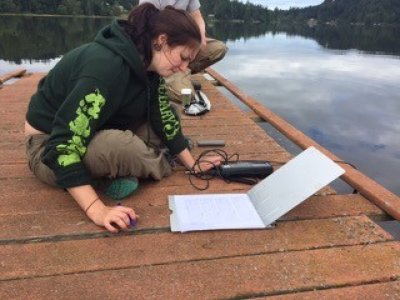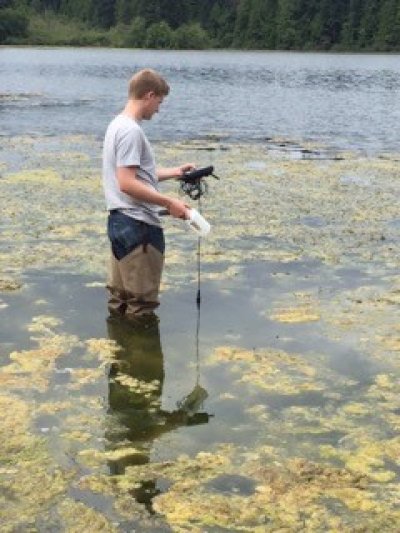Professor, students monitor quality of NW lakes
Western Washington University Professor of Environmental Science Robin Matthews, director of Western’s Huxley College of the Environment Institute for Watershed Studies, is working with two student volunteers to provide water-quality monitoring data for Washington lakes as part of the Institute’s Northwest Lakes monitoring program.
The Institute began the monitoring program in 2006 as a public service to provide baseline water quality data for local lakes that did not have ongoing water quality monitoring programs.
“My purpose was to provide water-quality data for the community in lakes that would not normally attract funding and also to provide students the opportunity to work in a certified lab,” Matthews said.
A series of water samples are collected by the student researchers and are brought back to the Institute for testing and to find a series of data points such as dissolved oxygen, phosphorous, turbidity and chlorophyll that will point to the overall water quality of the lake.
With a goal to make the research available to anyone who is interested in a particular lake, these basic water-quality parameters help reveal recent trends when comparing to six years of previous data, Matthews said.
Two examples of specific groups that have used the data collected from the Institute for Watershed Studies to develop lake management plans are People for Lake Padden and Friends of the Forest.
People for Lake Padden is a group of committed volunteers who work toward ensuring the lake’s waters are protected and to study the water-quality of Lake Padden and the land use in its watershed.
Friends of the Forest is based in Anacortes. The non-profit, volunteer organization is dedicated to the preservation of the Anacortes Community Forest Lands.
Until this year, there was no external funding for IWS Northwest Lakes research. It was strictly volunteers; a true public service, Matthews said.
Now the research has received several donations that go toward funding student researchers.
Driving all over the northwest corner of the state to collect and analyze water samples has been a great way to spend a summer, said Western junior Max Miner, an Environmental Science major from Seattle.
“I really like this part of it; it is probably the most fun to drive around and see a lot of places in the area that I hadn’t seen before and that I had no idea about,” he said.
Miner’s research partner, Holly Young, an Environmental Science major from Redmond, enjoys her work in the field and wants to pursue a career after graduation doing restoration works such as rebuilding streams and lakes. She grew up on two lakes, and maintaining water quality is something she finds special, she said.
“I applied for this because I needed an internship and I want to go into water-quality as my career for the rest of my life, so this was ideal,” Young said.
The Institute maintains an online database of water-quality data from over 60 lakes throughout Northwest Washington and also high-quality database of algae images for scientific study. For a complete list of the lakes, see the institute’s website at http://www.wwu.edu/iws/.
For more information on the Northwest Lakes Project, contact Robin Matthews at (360) 650-3507 or robin.matthews@wwu.edu.

